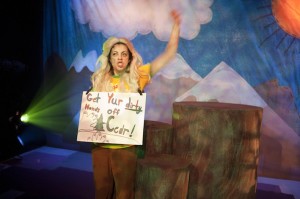A comic touch and Chilean politics are blended together on the Factory Studio Theatre stage in Toronto
I attended opening night of Carmen Aguirre’s Chile Con Carne at Factory Studio Theatre. Chile Con Carne is a solo show starring the incomparable Paloma Nuñez; the play is a fusion of politics and comedy, two of my favourite things, and I invited Mike, one of my most politically astute friends, to come along.
Chile Con Carne is the story of Manuelita, an eight-year-old Chilean refugee who fled her country with her family in the aftermath of the 1973 coup d’état. Manuelita shares her experiences as a newcomer to Canada, the trials her family faces as refugees and political activists, her struggle with her shifting identity, her desire to fit in and her crusade to save her favourite tree, Cedar, from a destructive development plan.
The play is bursting with poignancy and explores themes of racism, politics, class, beauty, shadeism, roots and culture. Carmen Aguirre’s script is tight which is no small feat considering that it follows the consciousness of a child whose imagination stretches far and wide.
The script takes us from forest to classroom to friend’s house to cultural centre to protest site and back again. Every scene is relevant and every utterance places Manuelita either in her immediate surroundings, her adopted city, Canada or the global political climate of 1975.
The subject matter is grave and intense but playwright Aguirre tempers this with gentle, honest, natural and funny observations of a child’s daily life.
Paloma Nuñez is charming and outstanding as the eight-year-old Manuelita. Under the weightless and invisible direction of Marilo Nuñez, Paloma Nuñez plays the character with a perfect balance of innocence and experience. She also embodies all the characters in Manuelita’s world. Nuñez transitions from one emotional state to the next with the grace and precision of a figure skater.
We empathize with Manuelita’s loss of homeland and family; we delight in her adoption of pop culture and disco dancing; we are frustrated by her struggle to belong to two worlds; we are enraged by the dictatorship’s brutality and the resulting post-traumatic stress Manuelita and her family experience.
Most of all, we are empowered by the political dissidence of Manuelita and her parents. It is this heritage that gives Manuelita, and the audience by proxy, the strength to fight for what she believes in.
Flavia Hevia’s set design is deceptively simple. Six tree trunks sit centre stage at the beginning of the play and Nuñez moves them around to create Manuelita’s classroom desk, various bedrooms, two different cars, the restroom at the Ukrainian community centre in Chinatown, and the disappearing forest. At opposite sides of the stage are apartment buildings where a silhouetted puppet show lays the scene.
The backdrop is a quilted landscape featuring snowcapped mountains, a blue sky and the sun. It is on this quilt that archival footage of Chilean protests, Salvador Allende and the bombing of Santiago are projected. Projection designer Cameron Davis also splices together images of Vancouver’s Chinatown, Augusto Pinochet and Manuelita’s grandmother.
My friend Mike is a cinephile and told me before the show that he seldom-to-never goes to the theatre. This did not impede his enjoyment of the play. We both liked the parallels of the personal and the historical. We both remarked on the harmony of Manuelita’s wisdom and naiveté. I loved the music which included traditional Chilean songs as well as disco hits of the day.
Mike was not sold on the logic behind the movement of the tree trunks. He was also unsettled by the tension in racial politics. Manuelita frequently expresses pride in her cultural heritage while simultaneously lamenting her darkness and otherness. I read this as a young person’s difficulty anchoring to an identity that is in a constant state of flux.
Chile Con Carne provides an important and excellent voice for the disenfranchised, the dispossessed and anyone who has ever yearned to belong.
Details
- Chile Con Carne is playing at Factory Studio Theatre (125 Bathurst Street) from April 2-14, 2013
- Shows run Tuesday-Saturday at 8pm, Wednesday matinee at 12:30pm, Sunday at 2:30pm
- Tickets: Adults: $22-$29 (Tuesday-Saturday), Sunday (PWYC), Students/Seniors: $15-$17
- Tickets can be purchased in person at the box office, by phone at 416-504-9971 or online
Photo of Paloma Nuñez by Edgardo Moreno

